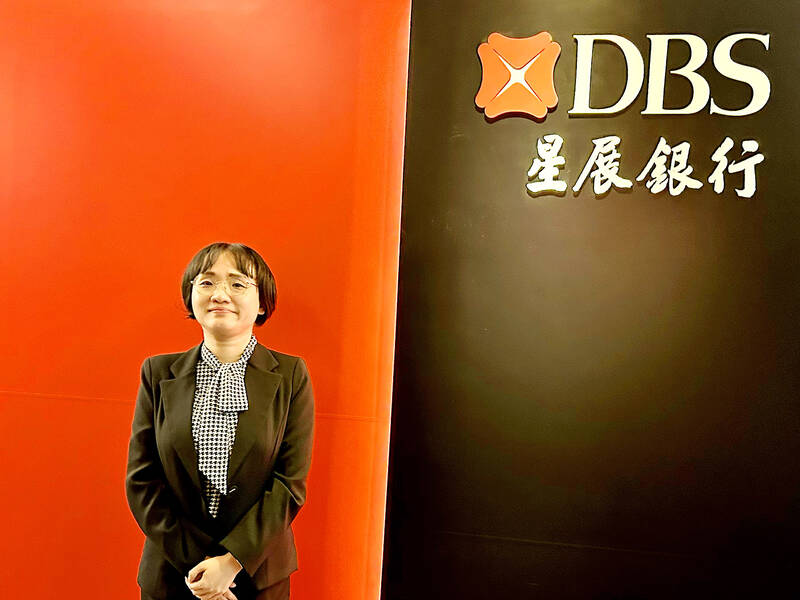The economy is forecast to grow 3 percent this year, slowing from a 4.4 percent increase last year, but consistent with a long-term growth trend on the back of rising demand for artificial intelligence (AI)-enabled smartphones, personal computers and other consumer electronics, Singapore-based DBS Bank Ltd (星展銀行) said yesterday.
Export growth is expected to remain in expansionary mode, although demand from AI data centers for servers would moderate after last year’s surge and a high base, DBS senior economist Ma Tieying (馬鐵英) said at a news conference in Taipei.
However, demand for AI-enabled mobile phones, notebook computers and other consumer electronic gadgets could gain traction, Ma said, noting that the upcycle in the global semiconductor sector typically lasts about 30 months and the current cycle, which began in September 2023, would therefore have the potential of extending throughout this year.

Photo: Wu Hsin-tien, Taipei Times
Private consumption is also to lose steam, but remain on trend given that the strong wealth effects of property and stock market rallies would taper off, she said.
Investment and speculative demand in the property market could diminish due to lingering credit controls, property taxes and anti-speculation measures, Ma said.
However, demand from first-time buyers and those seeking upgrades would remain resilient, she said.
Consumer price hikes would temper to 1.9 percent this year, lower than the 2.18 percent increase last year, with food and house prices normalizing from rapid advances induced by typhoons, electricity price hikes and higher housing rents, Ma said.
The US-China trade dispute and tech competition is set to escalate when US president-elect Donald Trump assumes power on Jan. 20, while Trump’s tariff threats on Chinese imports would impact Taiwanese manufacturers based there, she said.
Key products that Taiwanese companies produce in China include information and communications products, electrical machinery, optical instruments and electronic parts, Ma said.
Information and communications products and electrical machinery have a high resale ratio to the US, making them vulnerable to Trump’s 60 percent tariffs on Chinese goods, she said.
However, additional universal tariff hikes on all US imports would have limited impact on the competitiveness of Taiwanese products, she added.
As Taiwanese foundries command a dominant 80 percent of the global market for chips of 7-nanometer technology and below, Trump might pressure Taiwan to invest more in the US semiconductor sector and push for investment in 2-nanometer technology, posing challenges for Taiwan to retain its leadership in semiconductor technologies, Ma said.

Taiwan Semiconductor Manufacturing Co (TSMC, 台積電) yesterday said that its investment plan in Arizona is going according to schedule, following a local media report claiming that the company is planning to break ground on its third wafer fab in the US in June. In a statement, TSMC said it does not comment on market speculation, but that its investments in Arizona are proceeding well. TSMC is investing more than US$65 billion in Arizona to build three advanced wafer fabs. The first one has started production using the 4-nanometer (nm) process, while the second one would start mass production using the

When an apartment comes up for rent in Germany’s big cities, hundreds of prospective tenants often queue down the street to view it, but the acute shortage of affordable housing is getting scant attention ahead of today’s snap general election. “Housing is one of the main problems for people, but nobody talks about it, nobody takes it seriously,” said Andreas Ibel, president of Build Europe, an association representing housing developers. Migration and the sluggish economy top the list of voters’ concerns, but analysts say housing policy fails to break through as returns on investment take time to register, making the

‘SILVER LINING’: Although the news caused TSMC to fall on the local market, an analyst said that as tariffs are not set to go into effect until April, there is still time for negotiations US President Donald Trump on Tuesday said that he would likely impose tariffs on semiconductor, automobile and pharmaceutical imports of about 25 percent, with an announcement coming as soon as April 2 in a move that would represent a dramatic widening of the US leader’s trade war. “I probably will tell you that on April 2, but it’ll be in the neighborhood of 25 percent,” Trump told reporters at his Mar-a-Lago club when asked about his plan for auto tariffs. Asked about similar levies on pharmaceutical drugs and semiconductors, the president said that “it’ll be 25 percent and higher, and it’ll

CHIP BOOM: Revenue for the semiconductor industry is set to reach US$1 trillion by 2032, opening up opportunities for the chip pacakging and testing company, it said ASE Technology Holding Co (日月光投控), the world’s largest provider of outsourced semiconductor assembly and test (OSAT) services, yesterday launched a new advanced manufacturing facility in Penang, Malaysia, aiming to meet growing demand for emerging technologies such as generative artificial intelligence (AI) applications. The US$300 million facility is a critical step in expanding ASE’s global footprint, offering an alternative for customers from the US, Europe, Japan, South Korea and China to assemble and test chips outside of Taiwan amid efforts to diversify supply chains. The plant, the company’s fifth in Malaysia, is part of a strategic expansion plan that would more than triple